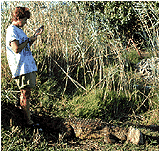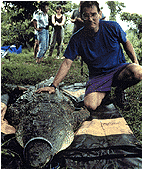|
|
 |
 |
Wrestling with Crocs (continued) (back) NOVA: What does their skin feel like?  Leslie: It comes as a surprise to most people. The back's pretty bony
and scaly, so it feels just as it looks. But you turn them over, and
they have this beautifully soft belly. You can actually watch their
heart beating. And it's so warm. Everyone thinks cold-blooded animals
should feel cold. But when a croc has been out in the sun and has been
pretty active, it feels remarkably warm.
Leslie: It comes as a surprise to most people. The back's pretty bony
and scaly, so it feels just as it looks. But you turn them over, and
they have this beautifully soft belly. You can actually watch their
heart beating. And it's so warm. Everyone thinks cold-blooded animals
should feel cold. But when a croc has been out in the sun and has been
pretty active, it feels remarkably warm.
NOVA: What sounds do they make? Leslie: Even with a pretty heavy dose of muscle relaxant, they know what's going on and they growl. The adults have this real bulldog growl. It's quite loud. The little ones make a sort of a cute chirping sound when you handle them. It sounds like a kitten that's trying to meow and can't quite get it right. And you'll hear them calling to each other, too. They disperse at night to feed, and in the morning they all call one another to regroup around mom. During the mating season, the big males also have a very deep sort of guttural growling. NOVA: What happens when you release a crocodile? The muscle relaxant wears off and then you just let it go?  Leslie: The release can be unsettling. We use an antidote for the muscle
relaxant, because without it the croc is out for about 12 hours. And it only takes two or three hours
for us to do our research on a given animal. So we pick up the animal
and, leaving the towel over its head, carry it down to the water's edge,
because we release it exactly where we captured it. We inject the
antidote into one of the animal's back legs. At the last second, we
remove the towel, take the tape off its mouth, and then just jump back.
Because they all wake up differently. Some take hours to stir, but
others will wake and bolt to the water in about 30 seconds.
Leslie: The release can be unsettling. We use an antidote for the muscle
relaxant, because without it the croc is out for about 12 hours. And it only takes two or three hours
for us to do our research on a given animal. So we pick up the animal
and, leaving the towel over its head, carry it down to the water's edge,
because we release it exactly where we captured it. We inject the
antidote into one of the animal's back legs. At the last second, we
remove the towel, take the tape off its mouth, and then just jump back.
Because they all wake up differently. Some take hours to stir, but
others will wake and bolt to the water in about 30 seconds.
NOVA: Does anything threaten such an indomitable creature? Leslie: They are losing breeding habitat, prey availability is decreasing, and water quality is changing. In Africa, there is also poaching. In many cases, poachers don't take the skin or the meat, which is a delicacy. They take select body parts—front and back legs, bits of tails, teeth, skulls—and sell them to the sangoma or witch doctors for medicinal use. Another threat is random killing. People have this fear of these big, ugly, dinosaur-looking things, like a fear of snakes. Crocs are not cute and cuddly, so a lot of rural people think when you see them, you kill them. NOVA: Did you always want to be a scientist?  Leslie: Oh, yes. From young kiddie days I always did the science stuff
and always loved it. When I was about 11 years old, I told my mom that I
was going to be a game ranger and work with animals somewhere in Africa.
After college, I spent three years backpacking around the world. It's
one of the best things I ever did. Then I went to graduate school, which
is probably the second best thing I ever did.
Leslie: Oh, yes. From young kiddie days I always did the science stuff
and always loved it. When I was about 11 years old, I told my mom that I
was going to be a game ranger and work with animals somewhere in Africa.
After college, I spent three years backpacking around the world. It's
one of the best things I ever did. Then I went to graduate school, which
is probably the second best thing I ever did.
NOVA: What skills do you need to be a croc researcher? Leslie: I think you need to be slightly wacko. No, seriously, when working with a potentially dangerous animal like a Nile crocodile, what you need more than anything is common sense. Of course, you need to fully understand the animal's behavior and ecology and the water system and so forth. But with that understanding comes respect for the animal, and from respect I think you gain common sense. The work is challenging. But if you have common sense, you should be fine doing croc work. NOVA: What kind of research are you currently doing? Leslie: I'm working on an eco-toxicology project. Looking at the effects of toxins on the reproductive systems of various animals, such as frogs and trout and freshwater turtles. But we've still got two croc projects going, and next year we want to look at the effects of toxins on two of our crocodile populations, one in St. Lucia and one in Kruger National Park.  NOVA: So you're not leaving crocs behind?
NOVA: So you're not leaving crocs behind?
Leslie: No! There's no way I can. I think once you start working with crocs you never stop. I'm definitely hooked. Photos: (1,5,8,12) Alison Leslie; (2-4,6,9-11,13,14) J.C. Lee; (7) Chris Marek Outlasting the Dinosaurs | Who's Who of Crocodilians Wrestling with Crocs | The Clickable Croc | Teacher's Guide | Resources | Transcript Editor's Picks | Previous Sites | Join Us/E-mail | TV/Web Schedule | About NOVA Watch NOVAs online | Teachers | Site Map | Shop | Search | To Print PBS Online | NOVA Online | WGBH © | Updated December 2003 |